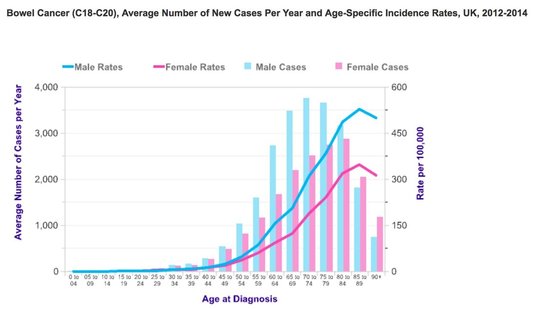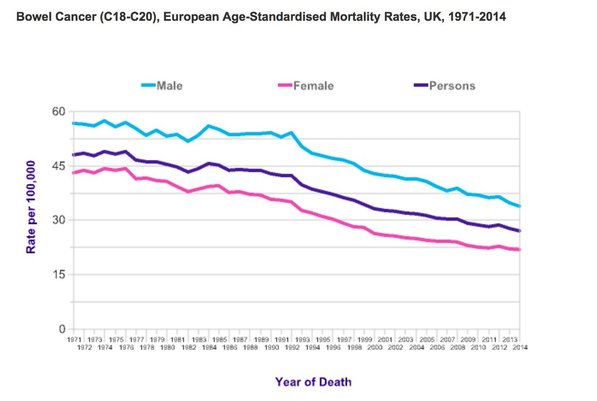|
April is Bowel Cancer Awareness Month.
Bowel cancer is the 4th most commonly diagnosed cancer is the UK. Over 40,000 new cases are diagnosed every year but only 57% of these patients will survive more than 10 years. About 94% of patients diagnosed with bowel cancer are 50+ years old. It is a disease that effects both men and women. While the number of people diagnosed with bowel cancer has not changed in the last 20 years, the number of patients losing their lives to this disease has started to fall. This is due to better understanding of risk factors, better screening and better treatments.
What is Bowel Cancer?
Bowel cancer is a disease that effects the "large bowel" which is made up of the colon and the rectum. This is why bowel cancer is commonly known as colorectal cancer. Bowel Cancer UK have a great interactive map on their website to explain what the large bowel is and how it works (https://www.bowelcanceruk.org.uk/about-bowel-cancer/the-bowel/). There are a number of symptoms for bowel cancer including:
Experiencing any of these symptoms over a prolonged period of time could be a sign of bowel cancer. However, if you are bleeding unexpectedly from anywhere I would definitely see a doctor straight away. How is Bowel Cancer Diagnosed? If bowel cancer is suspected, the patient can undergo a number of exploratory tests such as colonoscopy. This allows a doctor to see inside your large bowel and identify any areas of trauma or if there are polyps present. Polyps are small growths in the lining of your bowel. They can be benign (no disease) or malignant (disease). If a doctor sees polyps he will take a sample (called a biopsy) for further testing. This biopsy is used to determine if there is cancer present and what stage the cancer is. How is Bowel Cancer Treated? The most common treatments for bowel cancer are surgery, chemotherapy and radiotherapy. There are also more targeted therapies available for bowel cancer.
Bowel Cancer Screening: Approximately 50% of bowel cancers can be prevented. With improved screening techniques, patients can be diagnosed earlier. In the UK there is screening programme in people aged 50 - 75 years. It is called the FOBT (Fecal Occult Blood Test). This test detects small amounts of blood in your stool. It is an "at home" test which you can do yourself three times over a two week period and send to a screening centre. If there is no blood detected you are ask to repeat the procedure in 2years time. If there is blood detected you are brought in for further tests. If no cancer is detected, the patient is placed on an observation programme to ensure the patient doesn't get cancer. If there is cancer detected, the patient in given further treatment. The FOBT test is slowly being replaced with a more reliable test called FIT (Fecal Immunochemical Test). This test detects the same thing as FOBT but there are far less false positives (blood when there isn't blood) and it is only done once, not three times over a two week period. If you have been sent one of these kits, please make sure you do the test. I now it's a bit gross but it could save your life. All the information for this post was provided by: https://www.bowelcanceruk.org.uk/ http://www.cancerresearchuk.org/about-cancer/bowel-cancer
0 Comments
Leave a Reply. |
AuthorMy name is Caitriona and I am a PhD student at Imperial College London, UK. Categories
All
|




